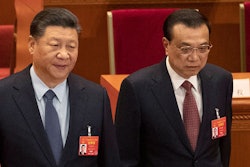BEIJING (AP) — Chinese legislators on Friday endorsed a law meant to help end a costly tariff war with Washington by discouraging officials from pressuring foreign companies to hand over technology.
The measure is part of an investment law that aims to address complaints by the United States, Europe and other trading partners that China's system is rigged against foreign companies despite Beijing's commitments to treat competitors equally.
The 3,000-plus delegates to the ceremonial National People's Congress rarely do lawmaking work. But their annual session, the highest-profile political event of the year, gives President Xi Jinping's government a platform to advertise changes aimed at ending a bruising battle with Washington that has disrupted trade in soybeans, medical equipment and other goods.
It was unclear whether the measure would mollify President Donald Trump, who launched the tariff war by raising U.S. duties on Chinese imports in response to complaints Beijing steals or pressure companies to hand over technology. Washington has yet to comment on the law.
American and Chinese negotiators are in the midst of rapid-fire negotiations aimed at ending the battle, which has disrupted trade in soybeans, medical equipment and billions of dollars' worth of other goods.
Washington also wants China to roll back plans for government-led creation of global competitors in robotics and other technologies. Its trading partners say those violate its market-opening obligations.
The official Xinhua News Agency said China's economy czar, Vice Premier Liu He, talked by phone with U.S. Trade Representative Robert Lighthizer and Treasury Secretary Steven Mnuchin. The one-sentence report said they made "further substantial progress" but gave no details.
The government said earlier the investment law will prohibit Chinese officials from using "administrative methods to force technology transfers." The wording of the final version of the law following amendments this week wasn't immediately released, but state media gave no indication the technology portion had changed.
Ahead of Friday's vote, foreign business groups welcomed the proposed law but said it might have been rushed through the approval too quickly. They said they will need to see how it is enforced to know whether it will improve conditions for foreign companies.
The law is "still quite general" and fails to address problems including the potential for unequal treatment of companies, the American Chamber of Commerce in China said in a statement Wednesday. It expressed concern about the broad scope of "national security reviews" allowed by the law and the impact of regulations on individual industries.
The European Union Chamber of Commerce in China earlier expressed concern the focus on "administrative methods" might mean officials still are free to use other tactics to pressure companies to hand over know-how.
Chinese officials deny companies are required to hand over technology. But they face pressures including requirements in industries including auto manufacturing and pharmaceuticals to work through state-owned partners, which requires to them provide technology to companies the ruling Communist Party hopes will become their competitors.
NPC delegates voted 2,929 to eight, with eight abstentions, in favor of the law — an unusually wide margin even for a powerless legislature that routinely endorses all ruling party policies.






















